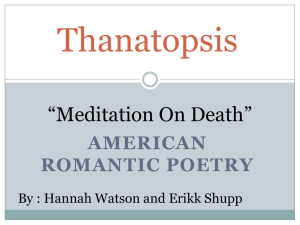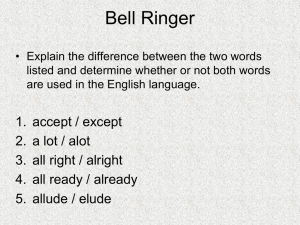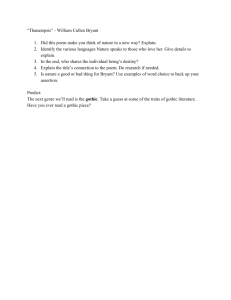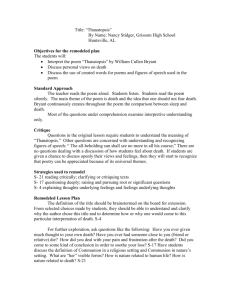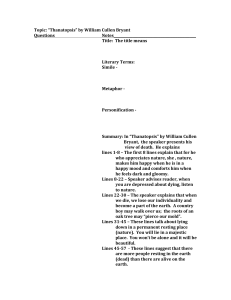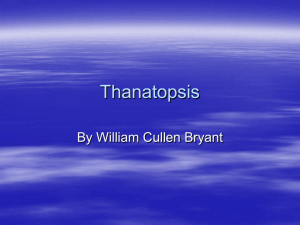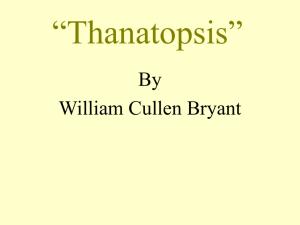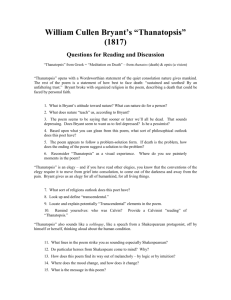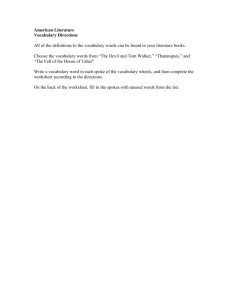File - Mrs. Bernard's English Classes
advertisement
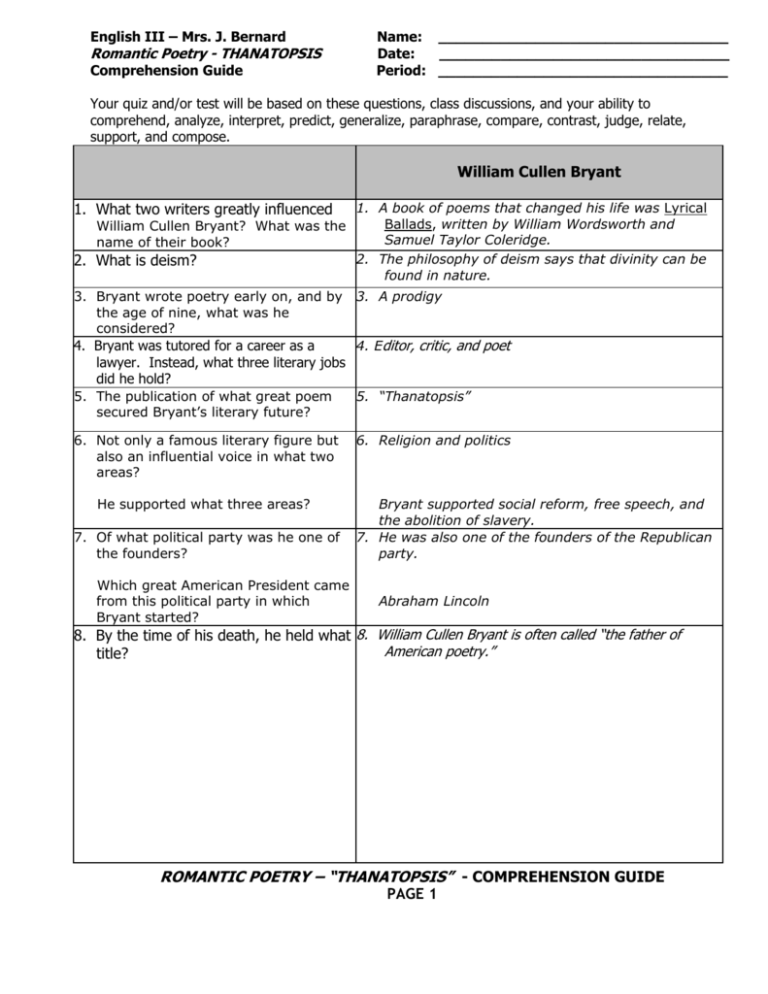
English III – Mrs. J. Bernard Romantic Poetry - THANATOPSIS Comprehension Guide Name: _________________________________ Date: _________________________________ Period: _________________________________ Your quiz and/or test will be based on these questions, class discussions, and your ability to comprehend, analyze, interpret, predict, generalize, paraphrase, compare, contrast, judge, relate, support, and compose. William Cullen Bryant 1. What two writers greatly influenced 1. A book of poems that changed his life was Lyrical Ballads, written by William Wordsworth and William Cullen Bryant? What was the Samuel Taylor Coleridge. name of their book? 2. The philosophy of deism says that divinity can be 2. What is deism? found in nature. 3. Bryant wrote poetry early on, and by 3. A prodigy the age of nine, what was he considered? 4. Bryant was tutored for a career as a 4. Editor, critic, and poet lawyer. Instead, what three literary jobs did he hold? 5. The publication of what great poem 5. “Thanatopsis” secured Bryant’s literary future? 6. Not only a famous literary figure but also an influential voice in what two areas? He supported what three areas? 7. Of what political party was he one of the founders? Which great American President came from this political party in which Bryant started? 6. Religion and politics Bryant supported social reform, free speech, and the abolition of slavery. 7. He was also one of the founders of the Republican party. Abraham Lincoln 8. By the time of his death, he held what 8. William Cullen Bryant is often called “the father of American poetry.” title? ROMANTIC POETRY – “THANATOPSIS” - COMPREHENSION GUIDE PAGE 1 “THANATOPSIS” Literary Focus: THEME The theme of literary work is the insight it offers into human experience. 9. What does THANATOPSIS mean? 9. Thanatopsis is a word Bryant coined by joining two Greek words, thanatos, “death,” and opsis, “sight.” The new word is defined by the poem: a way of looking at and thinking about death. Text Analysis: Blank Verse In this meter, each line has five iambic feet, a pattern consisting of an unstressed syllable (u ) followed by a stressed syllable ( ‘ ). William Cullen Bryant wrote “Thanatopsis” in a verse form known as blank verse. Read the following lines from “Thanatopsis” aloud to hear the rhythm: Blank verse is unrhymed poetry written in iambic pentameter. u ‘ u ‘ u ‘ u ‘ u ‘ To him who in the love of Nature holds u ‘ u ‘ u ‘ u ‘ u ‘ Communion with her visible forms, she speaks Notice that the lines do not have a singsong quality as some lines of rhymed poetry do. In fact, good blank verse imitates the natural rhythms of spoken English and so sounds very much like the way people talk. Bryant also achieves this effect through the use of enjambment, which means that one line ends without a pause and continues into the next line for its meaning. As you read “Thanatopsis,” notice how the poem’s rhythm imitates natural speech. Summary of “Thanatopsis” “Thanatopsis” is a poetic reflection on death. The poem begins with a statement of the consolation and “healing sympathy” that gentle and caring and beautiful Nature provides. The poet then suggests how to accept the mortality that all humans share and to face death without fear, “sustained and soothed by unfaltering trust . . . like one who . . . lies down to pleasant dreams.” Using your paraphrasing skills, closely read the following lines of “Thanatopsis, and summarize the stanzas in your own words. Lines 1-8 To him who in the love of Nature holds Communion with her visible forms, she speaks A various language; for his gayer hours She has a voice of gladness, and a smile 5 And eloquence of beauty, and she glides Into his darker musings, with a mild And healing sympathy, that steals away Their sharpness, ere he is aware. When thoughts ROMANTIC POETRY – “THANATOPSIS” - COMPREHENSION GUIDE PAGE 2 10. Reread lines 1–8 aloud. Identify the 10. places where a phrase begins at the end of a line and continues on the next line. How does this enjambment affect the flow of the lines? Lines 8-17 11–12 shroud . . . the narrow house: A shroud is a burial garment, while a pall is a heavy garment draped over a coffin. The narrow house is the grave or coffin. Their sharpness, ere he is aware. When thoughts Of the last bitter hour come like a blight 10 15 Over thy spirit, and sad images Of the stern agony, and shroud, and pall,° And breathless darkness, and the narrow house,° Make thee to shudder, and grow sick at heart;— Go forth, under the open sky, and list° To Nature’s teachings, while from all around— Earth and her waters, and the depths of air— Comes a still voice.— Lines 17-30 28–29 the sluggish clod . . . share: the heavy mass of earth, which the farmer loosens with his plow. Yet a few days, and thee The all-beholding sun shall see no more In all his course; nor yet in the cold ground, 20 Where thy pale form was laid, with many tears, Nor in the embrace of ocean, shall exist Thy image. Earth, that nourished thee, shall claim Thy growth, to be resolved to earth again, And, lost each human trace, surrendering up 25 Thine individual being, shalt thou go To mix forever with the elements, To be a brother to the insensible rock And to the sluggish clod, which the rude swain° Turns with his share,° and treads upon. The oak 30 Shall send his roots abroad, and pierce thy mold. ROMANTIC POETRY – “THANATOPSIS” - COMPREHENSION GUIDE PAGE 3 11. What is the central idea of the poem’s first section, lines 1–30? Lines 31-57 Yet not to thine eternal resting place Shalt thou retire alone, nor couldst thou wish Couch more magnificent. Thou shalt lie down With patriarchs of the infant world—with kings, 11. 33 couch: bed. 36 hoary seers: ancient wise men. 37 sepulcher: grave. 40 venerable: impressive and worthy of respect because of age. 51 Barcan desert: a desert region in northern Africa. 53 Oregon: old name for the Columbia River, which flows between the states of Washington and Oregon. 35 The powerful of the earth—the wise, the good, Fair forms, and hoary seers° of ages past, All in one mighty sepulcher. The hills Rock-ribbed and ancient as the sun,—the vales Stretching in pensive quietness between; 40 The venerable woods—rivers that move In majesty, and the complaining brooks That make the meadows green; and, poured round all, Old Ocean’s gray and melancholy waste,— Are but the solemn decorations all 45 Of the great tomb of man. The golden sun, The planets, all the infinite host of heaven, Are shining on the sad abodes of death, Through the still lapse of ages. All that tread The globe are but a handful to the tribes 50 That slumber in its bosom.—Take the wings Of morning,° pierce the Barcan wilderness,° Or lose thyself in the continuous woods Where rolls the Oregon,° and hears no sound, Save his own dashings—yet the dead are there: 55 And millions in those solitudes, since first The flight of years began, have laid them down In their last sleep—the dead reign there alone. 12. Identify the mood in lines 31–45. How 12. does it contrast with the mood in the first section? ROMANTIC POETRY – “THANATOPSIS” - COMPREHENSION GUIDE PAGE 4 Lines 58-72 So shalt thou rest, and what if thou withdraw In silence from the living, and no friend 60 Take note of thy departure? All that breathe Will share thy destiny. The gay will laugh When thou art gone, the solemn brood of care Plod on, and each one as before will chase His favorite phantom; yet all these shall leave 65 Their mirth and their employments, and shall come And make their bed with thee. As the long train Of ages glides away, the sons of men, The youth in life’s fresh spring, and he who goes In the full strength of years, matron and maid, 70 The speechless babe, and the gray-headed man— Shall one by one be gathered to thy side, By those, who in their turn shall follow them. SUMMARY: Live fully while you can, but when the time comes for Lines 73-81 So live, that when thy summons comes to join The innumerable caravan, which moves 75 To that mysterious realm, where each shall take His chamber in the silent halls of death, Thou go not, like the quarry slave at night, Scourged to his dungeon, but, sustained and soothed By an unfaltering trust, approach thy grave, you to join all those who have died before you, you can meet death serenely. 80 Like one who wraps the drapery of his couch About him, and lies down to pleasant dreams. Recall 13. 13. According to the speaker, how does nature help people cope during times of sadness? Recall 14. 14. According to lines 22–30, what happens to people when they die? Clarify 15. Why, according to the speaker, should people greet death without fear? 15. ROMANTIC POETRY – “THANATOPSIS” - COMPREHENSION GUIDE PAGE 5 Analyze Title 16. The title of the poem combines the Greek words thanatos (“death”) and opsis (“a vision”). Cite specific details from the poem to explain the vision of death presented in “Thanatopsis.” 16. Understand Structure Common Core Focus: Understand Structure 17. Identify the central idea in each section, 17. Central idea— and draw conclusions about how the section 1: poem’s structure helps develop an section 2: overall message. section 3: Draw Conclusions About Tone 18. 18. A writer establishes his or her tone, or attitude toward a subject, through a variety of language choices. Use a chart to jot down important examples of Bryant’s word choices, details, and direct statements. Then draw conclusions about the poem’s tone. Evaluate Blank Verse 19. How would the impact of Bryant’s 19. message differ if he had used a strict meter and regular pattern of rhyme in his poem? Evaluate whether his use of blank verse is an effective or pleasing way to express his ideas. Give reasons for your opinion. Recognize Characteristics of Romanticism Common Core Focus : Evaluate Blank Verse 20. 20. How does “Thanatopsis” reflect Romantic notions of nature and democratic values? Different Perspectives 21. Bryant at age 70: 21. Bryant wrote “Thanatopsis” when he was a very young man. He was also greatly influenced by the English romantic poets. Given what you have learned a Puritan: about the Puritans and the romantic poets, how do you think the following people might have reacted to the poem? • Bryant at age 70 an English romantic poet: • a Puritan • an English romantic poet ROMANTIC POETRY – “THANATOPSIS” - COMPREHENSION GUIDE PAGE 6

